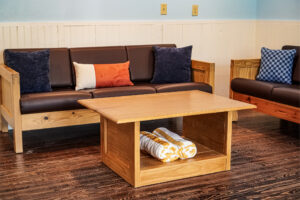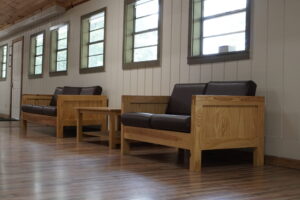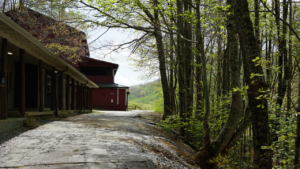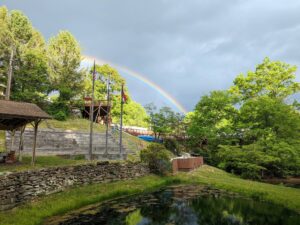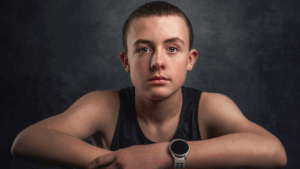When your teenager is struggling with severe mental health challenges, the decision to consider residential treatment can feel overwhelming. For families throughout North Carolina, understanding the residential treatment landscape and finding the right program becomes crucial for ensuring your adolescent receives the comprehensive care they need to heal and thrive.
Understanding Teen Residential Treatment
Teen residential treatment provides intensive, 24/7 therapeutic support for adolescents experiencing mental health challenges that cannot be adequately addressed through outpatient therapy alone. These programs combine clinical sophistication with structured living environments designed specifically for adolescent development and healing.
Unlike hospital-based psychiatric care, which focuses primarily on crisis stabilization, residential treatment programs provide comprehensive intervention that addresses the underlying causes of mental health struggles while building long-term coping skills and resilience. The therapeutic community model allows teenagers to practice new skills in a supportive environment while receiving continuous professional guidance.
Residential treatment typically serves adolescents who are experiencing severe depression, anxiety, trauma responses, self-harm behaviors, suicidal ideation, substance use issues, or behavioral challenges that significantly impact their ability to function safely at home, school, or in their community. These programs provide the intensive intervention necessary to interrupt destructive patterns and establish healthier ways of thinking, feeling, and behaving.
The Current State of Teen Residential Treatment in North Carolina
North Carolina faces significant challenges in meeting the residential treatment needs of its adolescent population. Currently, there’s an estimated shortage of hundreds of residential beds for children in Western North Carolina alone. This shortage has created substantial waiting lists and has forced many families to seek treatment options outside the state or go without the intensive services their teenagers desperately need.
The limited availability of teen residential treatment in North Carolina reflects broader challenges in the state’s mental health infrastructure. With North Carolina ranked 45th in access to pediatric mental health care, families often struggle to find appropriate treatment options that can address their teenager’s specific needs while remaining geographically accessible.
Among the teens in North Carolina who experience major depression, just over 70% did not receive any consistent mental health services, due in part to the lack of residential mental health treatment centers for teens in the state. The national rate is around 55%. This treatment gap highlights the critical need for additional residential treatment options that can serve families throughout North Carolina.
The existing residential treatment centers in North Carolina vary significantly in their approaches, specializations, and treatment philosophies. Some focus primarily on substance use disorders, while others specialize in eating disorders, trauma, or general mental health challenges. Understanding these differences becomes crucial for families seeking the most appropriate treatment for their teenager’s specific needs.
Key Components of Effective Teen Residential Treatment
The most effective teen residential treatment programs share several critical components that distinguish them from less comprehensive options. Clinical sophistication forms the foundation, with evidence-based therapeutic approaches such as Cognitive Behavioral Therapy (CBT), Eye Movement Desensitization and Reprocessing (EMDR), Trauma-Focused CBT, and family therapy providing the clinical backbone of treatment.
Academic integration ensures that teenagers don’t fall behind in their education while focusing on their mental health. Licensed, accredited educational programs allow students to continue their academic progress in small, supportive classroom environments that accommodate their therapeutic needs and learning challenges.
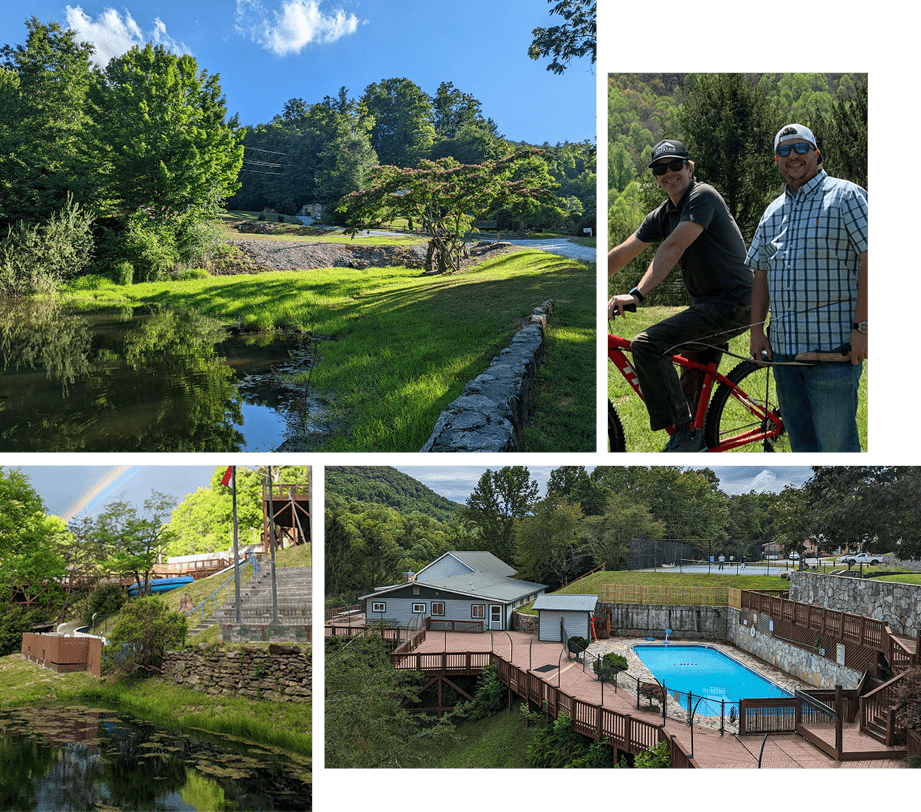
Family involvement represents another crucial component of effective residential treatment. The most successful programs actively engage families in the healing process, recognizing that sustainable recovery requires addressing family dynamics and equipping parents with the tools they need to support their teenager’s ongoing mental health.
Experiential therapy components help teenagers apply their therapeutic insights in practical, engaging ways. Outdoor adventures, creative arts, recreational activities, and skill-building experiences provide opportunities for growth that extend beyond traditional talk therapy settings.
The Unique Advantages of North Carolina’s Natural Environment
North Carolina’s diverse natural landscape provides unique therapeutic opportunities for adolescent residential treatment. The state’s mountain regions offer peaceful, distraction-free environments where teenagers can focus intensively on their healing without the pressures and triggers that may exist in their home communities.
Mountain environments have been shown to have particular benefits for adolescents struggling with mental health challenges. The slower pace of mountain life allows for deeper reflection and mindfulness practice, while outdoor activities provide natural opportunities for building confidence, developing problem-solving skills, and creating positive experiences that counteract negative thought patterns.
The Blue Ridge Mountains, in particular, offer a stunning backdrop for therapeutic work. The natural beauty provides a calming influence that supports emotional regulation, while the variety of outdoor activities available helps teenagers discover new interests and talents that can become part of their long-term recovery and personal identity.
Research consistently demonstrates that outdoor experiences and nature-based interventions can significantly reduce symptoms of anxiety and depression while improving overall mental health outcomes. For teenagers who have been struggling with mental health challenges, the opportunity to experience success and joy through outdoor activities can be transformative.
Selecting the Right Residential Treatment Program
Choosing the right residential treatment program for your teenager requires careful consideration of multiple factors. The program’s clinical approach should align with your teenager’s specific mental health challenges and treatment needs. Programs that integrate evidence-based therapeutic approaches with experiential learning typically provide the most comprehensive intervention.
Accreditation and licensing ensure that the program meets established standards for safety, clinical quality, and educational services. Programs should be licensed by the state and accredited by recognized organizations that evaluate residential treatment facilities.
Staff qualifications and training represent critical factors in program effectiveness. Look for programs with licensed clinical professionals, trained residential staff, and appropriate staff-to-student ratios that ensure adequate supervision and individualized attention.

The length of stay should be appropriate for your teenager’s needs. While some programs offer short-term crisis intervention, others provide longer-term treatment that allows for deeper therapeutic work and more sustainable skill development. Average lengths of stay between 90-180 days often provide sufficient time for meaningful change while avoiding unnecessarily prolonged separation from family and community.
Family involvement policies should align with your family’s needs and values. The most effective programs actively involve families in treatment planning, provide regular family therapy sessions, and offer structured opportunities for family visits and participation in therapeutic activities.
The Treatment Process and What to Expect
Teen residential treatment typically begins with a comprehensive assessment that evaluates your teenager’s mental health challenges, strengths, family dynamics, academic needs, and treatment goals. This assessment forms the foundation for developing an individualized treatment plan that addresses your teenager’s specific needs.
The initial phase of treatment often focuses on safety, stabilization, and engagement in the therapeutic process. Teenagers may need time to adjust to the residential environment and begin building trusting relationships with staff and peers. This phase includes introducing coping skills, addressing immediate safety concerns, and beginning to explore underlying issues.
The intensive treatment phase involves deeper therapeutic work, family therapy sessions, academic engagement, and participation in experiential activities. Teenagers work to understand the roots of their mental health challenges, develop new coping strategies, practice relationship skills, and build confidence through successful experiences.
The transition planning phase prepares teenagers and families for a successful return to the home community. This includes developing aftercare plans, connecting with ongoing therapeutic supports, addressing any academic or social adjustments needed, and ensuring that families have the tools and resources they need to support continued progress.

Addressing Common Concerns About Residential Treatment
Many families have concerns about residential treatment that can make the decision more difficult. Understanding these concerns and how quality programs address them can help families make informed decisions about their teenager’s care.
Geographic distance often concerns families who worry about being separated from their teenager during treatment. While it’s natural to want to be close to your child, sometimes the most effective treatment requires removing teenagers from their familiar environment to allow for focused therapeutic work. Quality programs facilitate regular communication between families and their teenagers while providing structured opportunities for visits and family participation.
The stigma sometimes associated with residential treatment can create additional stress for families. It’s important to understand that seeking residential treatment represents a proactive step toward helping your teenager develop the skills they need for long-term success. Many successful adults have benefited from residential treatment during their teenage years.
Academic concerns about teenagers falling behind in school are addressed through accredited educational programs that ensure continued academic progress. Many teenagers actually improve academically during residential treatment as their mental health challenges are addressed and they receive more individualized educational support.
Cost and insurance coverage represent practical concerns for many families. While residential treatment represents a significant investment, many insurance plans provide coverage for medically necessary mental health treatment. Programs often work with families to explore insurance benefits and develop payment plans that make treatment accessible.
The Long-Term Benefits of Quality Residential Treatment
Quality teen residential treatment provides benefits that extend far beyond the immediate treatment period. Teenagers who receive comprehensive residential treatment often develop stronger coping skills, improved emotional regulation, better relationship abilities, and increased resilience that serves them throughout their lives.
Academic improvements frequently follow successful residential treatment, as teenagers are better able to concentrate, engage in learning, and manage academic pressures when their mental health challenges are effectively addressed. Many teenagers discover new interests and talents during residential treatment that become part of their long-term identity and future goals.
Family relationships often improve significantly following residential treatment, as both teenagers and parents develop better communication skills, clearer boundaries, and more effective ways of supporting each other. The family therapy component of residential treatment helps address relational patterns that may have contributed to or maintained mental health struggles.
The peer relationships developed during residential treatment can provide ongoing support and connection. Many teenagers maintain friendships with peers they meet during treatment, creating a network of individuals who understand their experiences and can provide mutual support.
BlueRock Behavioral Health
Recognizing the critical shortage of teen residential treatment options in North Carolina, BlueRock Behavioral Health has opened to provide high-quality, accessible care for adolescents and their families. Located on a scenic 140-acre campus in the Blue Ridge Mountains near Asheville, BlueRock offers a comprehensive residential treatment program specifically designed for teenagers ages 12-17.
BlueRock’s approach addresses the limitations many families have experienced with other treatment options. As a publicly funded program with a private-pay experience, BlueRock was founded on the core belief that any family in crisis should have access to the highest quality mental health resources available, regardless of socioeconomic status.
A New Option for North Carolina Families
The program integrates evidence-based clinical treatment with North Carolina’s natural mountain environment to create a unique therapeutic experience. Clinical approaches include EMDR, Trauma-Focused CBT, Collaborative Problem-Solving, and Neurofeedback, delivered by licensed professionals with extensive experience in adolescent mental health treatment.
BlueRock’s relationship-based model recognizes that trusting relationships drive meaningful change. The program’s size allows for individualized attention and the development of genuine therapeutic relationships between staff and students. The average length of stay of 90-180 days provides sufficient time for deep therapeutic work while preparing families for successful long-term recovery.
The academic component, Bearwallow Academy, provides fully accredited education with small class sizes and individualized support. Students continue their academic progress while receiving the mental health treatment they need, ensuring that treatment doesn’t derail their educational goals.
Family involvement forms a cornerstone of BlueRock’s approach. Weekly family therapy sessions, regular communication, structured campus visits, and family seminars ensure that parents are actively engaged in their teenager’s healing process and prepared to support continued progress after treatment.
The experiential programming takes full advantage of North Carolina’s mountain environment. From hiking and mountain biking to team challenges, outdoor activities provide opportunities for teenagers to build confidence, practice new skills, and experience success in ways that reinforce their therapeutic progress.
BlueRock’s values of responsibility, respect, family relationships, principled living, and physical and emotional health are woven throughout all aspects of the program. This holistic approach addresses the whole person rather than focusing solely on symptoms, creating a foundation for lasting change and personal growth.
Taking the Next Step Toward Healing
The decision to pursue residential treatment represents a courageous step toward giving your teenager the best possible opportunity for recovery and long-term success. Don’t let the shortage of residential treatment options in North Carolina prevent your teenager from receiving the care they need. Quality programs exist that can provide the intensive intervention, family support, and long-term preparation necessary for sustainable recovery and personal growth.
The sooner appropriate intervention begins, the better the outcomes tend to be. Mental health challenges in teenagers are highly treatable when addressed with comprehensive, evidence-based care delivered in a supportive, relationship-based environment.
Your teenager’s mental health struggles don’t define their future potential. With the right treatment and support, even teenagers facing significant mental health challenges can develop the skills, resilience, and hope they need to build fulfilling, successful lives.
BlueRock Behavioral Health is ready to help your family navigate this challenging time and find the path to healing and hope. Our experienced team understands the difficulties facing North Carolina families seeking teen residential treatment, and we’re committed to providing the comprehensive, compassionate care your teenager deserves. Contact us today at 828-671-3003 to learn more about how BlueRock can help your family transform crisis into opportunity for growth, healing, and lasting positive change.






